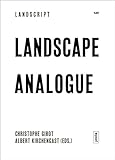Landscape Analogue : About Material Culture and Idealism / ed. by Christophe Girot, Albert Kirchengast.
Material type: TextSeries: Landscript ; 6Publisher: Berlin : JOVIS, [2023]Copyright date: ©2023Description: 1 online resource (240 p.) : zahlr. AbbContent type:
TextSeries: Landscript ; 6Publisher: Berlin : JOVIS, [2023]Copyright date: ©2023Description: 1 online resource (240 p.) : zahlr. AbbContent type: - 9783868595413
- 9783868599749
- 712.01 23/eng/20220830
- SB472.45 .L26 2022
- online - DeGruyter
- Issued also in print.
| Item type | Current library | Call number | URL | Status | Notes | Barcode | |
|---|---|---|---|---|---|---|---|
 eBook
eBook
|
Biblioteca "Angelicum" Pont. Univ. S.Tommaso d'Aquino Nuvola online | online - DeGruyter (Browse shelf(Opens below)) | Online access | Not for loan (Accesso limitato) | Accesso per gli utenti autorizzati / Access for authorized users | (dgr)9783868599749 |
Frontmatter -- TABLE OF CONTENTS -- Foreword -- The Analogue, the Adaptive, and the New : Thinking the Grammar of Landscape -- Toward a Theory of Contemporary Landscape Ornament -- The “Green Image of the City” Mapping Zurich : A Case Study -- Távora, Siza, and Nature -- Museum Insel Hombroich : The Construction of an Alternative Natural Space -- Ruach : Two Children -- A Farewell to the Concept of Landscape ? -- A Vision of the Rural -- The Ethical Relevance of Simple Things Art, Crafts, Design, and Modern Life -- Other Ways We Could Build -- The Simple’ s Strength Rethinking Vernacular Form -- Licht im Norden -- To Design Is to Transgress : Toward an Understanding of Architectural Design -- The Essence of the Analogy in Architecture— And the Spirit of cittá analoga -- Carpet of Memory : Messages from Monuments -- Prospectus for an Academy in the Countryside A Dialogue -- Appendix -- IMPRINT
restricted access online access with authorization star
http://purl.org/coar/access_right/c_16ec
The difficulty of reconciling our basic needs with the long history of cultural landscapes, in all their inherent beauty and sufficiency, has become clear. With our deep trust in modern technology, in progress and in a demanding global lifestyle we have become a real threat to our world. Yet, today the existential and elementary nature of landscapes remains the bearer of a successful metaphor for “balance”. Why not draw—amidst a truly global crisis—conclusions out of our long history of designed nature, of places shaped by skilled labor and a quest for pleasure? Landscape Analogue seeks to stimulate the “Analogue” dimension as a substantial concept for everyday landscape thinking. In an anthology of interdisciplinary essays, Landscript 6 stresses the necessity for a fundamental shift, within the likely framework of a future of restricted resources, a radically different mobility or “hot” cities.
Zweifellos war es nie einfach, unsere steigenden Bedürfnisse mit der uralten Geschichte der Kulturlandschaften, ihrer Schönheit und Fülle in Einklang zu bringen. Mit unserem Vertrauen in die moderne Technik, in Fortschritt und einen anspruchsvollen globalen Lebensstil sind wir jedoch zu einer Bedrohung für die Welt geworden. Und doch ist die existenzielle und elementare Natur der „Landschaft“ nach wie vor eine wertvolle Metapher für „Gleichgewicht“. Warum sollten wir – inmitten einer globalen Krise – aus der langen Geschichte gestalteter Naturräume, von Orten, die durch handwerkliche Arbeit wie einem Streben nach Zufriedenheit gleichermaßen geformt wurden, heute keine Schlüsse ziehen? Landscape Analogue diskutiert das „Analoge“ als grundlegendes Konzept und regt ein Nachdenken über den Alltag von Landschaften als Lebensraum der Zukunft an. Der Sammelband vereint kritische Aufsätze, die von der Notwendigkeit eines grundlegenden Wandels geprägt sind – angesichts einer Zukunft, die von endlichen Ressourcen, einer radikal reduzierten Mobilität und „überhitzten“ Städten geprägt sein wird.
Issued also in print.
Mode of access: Internet via World Wide Web.
In English.
Description based on online resource; title from PDF title page (publisher's Web site, viewed 06. Mrz 2024)


